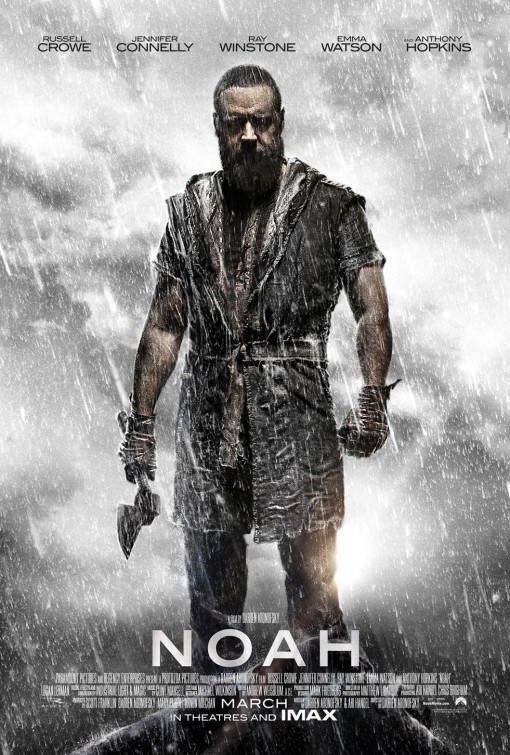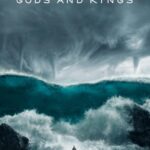The End Of Everything. The Beginning Of Everything.
Director
Darren Aronofsky
Starring
Russell Crowe
Jennifer Connelly
Ray Winstone
The creator made man and after his disobedience, mankind was cast out of paradise and sent to live a life of toil and misery on Earth to atone. The first generation born gave rise to two distinct family lines: the first being of Seth, an honourable people and the second being of Cain, the first murderer. The descendants of Cain were marked and cursed with a bottomless lust and overinflated sense of ego and expansion, taking everything they believed there’s. Generations later, the young Noah (the last living descendant of Seth’s line) witnesses his father’s murder at the hand of Tubal-Cain, King of men. Years later, Noah [Crowe] raises his own family and is chosen by the creator to build a vessel to house the innocents of Earth (specifically the animals). Word of Noah’s stronghold spreads across the land and the ageing Tubal-Cain [Winstone] amasses an army and descends upon Noah’s family. Sure enough, the flood comes and an all-out battle ensues to protect those deemed worthy by the creator, interpreted by Noah. As the seas subside, Noah is left with doubt, questions and an unyielding sense of guilt at his potential weaknesses and failings.
Since the inception of cinema, religious texts have been drawn upon as word-for-word adaptations, inspiration and allegory. Throughout the first half of the twentieth century Western audiences were presented with very literal representations of bible stories, which quickly gave way to tales with metaphorical similarities and themes. Fourteen years into the twenty first century and religious films are a subject of immediate debate and scrutiny. Setting aside the arguable success of The Passion Of The Christ, contemporary audiences prefer a broader spiritual approach, specifically things like Life Of Pi, either that or action schlock (Legion). Noah differs from these by taking the biblical story of Noah’s ark and treating it like a Shakespearean adaptation; all the key elements are there but they are presented in a fashion that we wouldn’t immediately associate with a bible story. With any other adaptation this is called artistic licence but in the eyes of more passionate and outspoken religious individuals, this is considered blasphemy. Personally, I think it’s one of the best biblical adaptations ever filmed.
As a child bombarded with biblical passages every Sunday, one of my major hang-ups was the broken and unrealistic storytelling. Two thirds of it made no sense and every time a character spoke I rolled my eyes. The older I got, the more I confirmed my belief that the bible is a collection of parables and fables, not a historical document but that frustration with the plot-holes and unrelatable figures stayed with me. As a filmmaker the biggest mistake you can make is presenting a biblical character without humanity, as just a steadfast unwavering, undoubting voice. The key to this film’s success (if that’s the right word) is the melodrama and psychological analysis of extreme loyalty and survivor’s guilt which makes these central characters immediately identifiable. In this way, the cast are divided straight down the middle between memorable characters and everyone else; whether through scripting or acting prowess, the standout individuals are Crowe, Connelly, Emma Watson, Logan Lerman and Winstone (and arguably Frank Langella). All of whom provide not only a captivating and at times harrowing portrayal of a familiar tale but also a simple empathetic portrayal of a family unit forced between a rock and a hard place by their patriarchal leader.
A great deal of production measures have been taken to keep the film in a loose, alternate world, unascertainable time period, so as to avoid outcry from zealots, believers and stalwarts on all sides of the debate. So much so that if you were to change Noah’s name to Conan, it could easily be marketed as a fantasy film and no one would bat an eyelid. From the design of the stone golem angels (with their beautiful retro stop-motion movements) and the fictional CGI animal hybrids, everything to the landscape and costumes, everything has been constructed to give an otherworldly feel. Having said that, the film’s biggest downfall is the quality of said CGI animals. Almost everything looks grand and services the plot with precision and ease but the animals were just utter shit. Scaly deer? Fine, I don’t have a problem with that, you’re trying to present possible ancestors to modern-day creatures, I understand. Up close these animals work well but the second you pan out and reveal more than ten or twenty of them, the detail is lost and we’re left with a haze of brown CGI smothering the screen. Yet this terrible aspect can almost be entirely overlooked thanks to Clint Mansell’s thundering, crushing score. Everything about it is perfectly suited for IMAX and indeed any cinematic experience. Booming, crashing, epic tones, frenzied, terrifying chaos and disorder, climactic rolls and stings, the entire instrumental movement not only compliments the on-screen developments but heightens the emotional stakes for all involved. And yes, makes the crappy CGI tolerable.
Then there’s the direction. This is evidently a personal project for Aronofsky and one he has been keeping on the back burner for several years. Every other Noah adaptation, whether catering to a young audience or attempting something serious, plays the event of the flood itself almost light-heartedly, illustrating people being washed away and never seen or heard again – given a quick and seemingly quiet death. Aronofsky’s direction is much more unforgiving than that. He has a story to tell and has no intention of glorifying or sparing any character or action from analytical scrutiny; you’re either on-board or left behind (no pun intended there). In one particular scene the world has been flooded and Noah’s family sit in the darkness, listening to the deafening agonising screams of the dying population. Everyone on the boat pleads to spare those outside, well within reach of the boat, only for Noah to explain that there is no saving them. Then we cut to the horrors outside. There is only sea and sky, with the cuboid boat listing on the waves, as the last remnants of humanity cling to what must have been a high mountain top, as the tide crashes against the rock, sweeping several people to their slow deaths. It’s a really brutal image and a surprisingly moving moment. And it’s that kind of representation of a simple one sentence bible passage that really hits home and gives this movie a curiously powerful sense of resonance and might. In truth, if you simply surrender yourself to the movie (as a movie) and cast all religious preconceptions from your mind, Noah becomes a genuinely interesting and well-presented piece of cinema, utilising the brutal framework of the Old Testament. It could be that this is a new trend of filmmaking. A fair few veteran directors seem to be turning to the old bible-epic, sword and sandal pieces from their childhood – Ridley Scott’s next film, Exodus: Gods And Kings details Christian Bale as Moses – but as stated earlier, I treat this as any other adaptation of any other story: the filmmakers take liberties with elements to present a clearer narrative. Some elements work, others fail. It may be disappointing for the general public but to other filmmakers, film historians and critics, it’s a fascinatingly bold portrayal of fanaticism, stubbornness and the evil in all men.
Release Date:
4th April 2014
The Scene To Look Out For:
Two distinctly interesting scenes standout for me. The first is Noah detailing the story of creation, which verbally matches that of the bible but visually presents evolution. No doubt this is a hybrid that will piss off a lot of creationists but makes sense to me: hybrid storytelling that presents both interpretations as fact. The second scene takes place after Noah’s son Ham explains that he will not have a wife in the new world. As such, Noah dons a robe and goes out to the encampment of mankind and witnesses all manner of savage cannibalistic horrors, with people trading their daughters for meat. In amongst this misanthropic representation of the evil of man, Noah catches sight of one particular unfortunate and sees his own face. An image that starts a chain reaction process in Noah’s mind, leading him to the conclusion that he and his family are equally human and therefore equally flawed, therefore his line must end after the task of saving the animals is complete. A traumatising scene but one that really cements the drive of the story’s lead.
Notable Characters:
I’m a fan of Russell Crowe, I think he adds a great deal of gravitas to almost any production he appears in and even at his weakest, he’s still better than most. The Noah presented by Aronofsky is perfect for Crowe. Driven and resolute, brooding and merciless, very few individuals can pull of all that weight with a simple grizzled expression and desperately determined stare. He could have broken down more or shouted more but this uncharacteristic representation of the familiar hardworking, well-mannered, old man is a really interesting character study brought to life extremely well.
Highlighted Quote:
“Her name was Na’el and she was innocent”
In A Few Words:
“An impressive, if thoroughly bombastic, spectacle that is sure to test and divide its audience”
Total Score: 4/5
![The Red Right Hand Movie Reviews [Matthew Stogdon]](https://reviews.theredrighthand.co.uk/wp-content/uploads/2021/12/cropped-header1.png)




